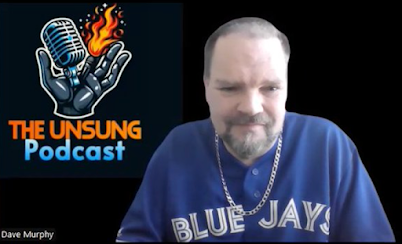Unsung Stories of Courage and Healing: A Conversation with Dave Murphy
On this episode of Life Unscripted with Rosabel, I had the absolute joy of sitting down with a remarkable human being: Dave Murphy, host of The Unsung Podcast and author of two deeply moving children’s books. Our conversation was laced with moments of raw honesty, laughter, reflection, and mutual encouragement, all underscored by a shared mission: to use our voices and platforms to lift up the stories that often go untold.
From Trauma to Triumph
Dave’s story is one of profound resilience. In 1994, he survived a violent knife attack that left him with physical and emotional scars. Struggling with PTSD for over two decades, Dave turned to alcohol and unhealthy habits as a way to cope—until his daughter became his turning point. Her simple desire to race her dad home from the playground, and his inability to keep up, sparked a life-changing transformation.
Over several years, Dave lost 170 pounds, gave up alcohol, and completely rewired his lifestyle—all while raising his daughter and finding joy in their shared journey toward health and healing.
A Voice for the Unsung
That same little girl who sparked his transformation also inspired his first book, The Great Race: My Daddy and Me. It's more than a children’s story; it's a symbol of hope for families seeking a healthier path. His second book, In the Heart of the Forest, uses the metaphor of a fox facing its fears to discuss trauma and courage, touching readers of all ages and backgrounds.
But Dave didn’t stop there. He launched The Unsung Podcast, a space to highlight the real, raw, and remarkable stories of people who rarely make the headlines. From blind mountain climbers and Special Olympians to domestic abuse survivors and everyday heroes, Dave’s podcast celebrates human strength in its quietest, most potent forms.
Music, Humor, and the Courage to Share
What I admire most about Dave is his humility. Whether he’s nervously performing guitar at a church concert (sober, for the first time!) or reading his book in Spanish with a Puss-in-Boots accent, Dave brings sincerity and humor to everything he does. We laughed about awkward language learning moments and bonded over emotional movie scenes (Titanic, anyone?).. We talked about how the smallest acts—like showing up or looking someone in the eye—can be transformative.
Our conversation also touched on:
-
How Dave’s viral transformation post got picked up by Arnold Schwarzenegger (and how he handled the trolls).
-
His live mental health open mic project, “Rock and Resilience.”
-
The importance of consistency and joy in podcasting, even when the numbers don’t seem impressive.
-
We both believe deeply in sharing our stories—not for fame, but for impact.
Final Words of Wisdom
Dave gave us a simple but powerful message: “If you’re struggling, talk to someone. Just get through the next five minutes. Your day can start over at any time.”
He also reminded us that the size of your audience doesn’t matter—what matters is who you reach. As he said, “If your episode has 52 plays, but one person writes you to say it saved their life? That’s the only play that counts.”
🎧 Listen, Subscribe, and Share
If you’re looking for stories that make you feel seen, uplifted, and deeply moved, I encourage you to subscribe to The Unsung Podcast with Dave Murphy. You can find it on Spotify, Apple Podcasts, iHeartRadio, and more.
Of course, I’d love for you to subscribe to Life Unscripted with Rosabel. Let’s keep building a community rooted in storytelling, connection, and healing—one real conversation at a time.
Until next time, stay curious and stay kind.








